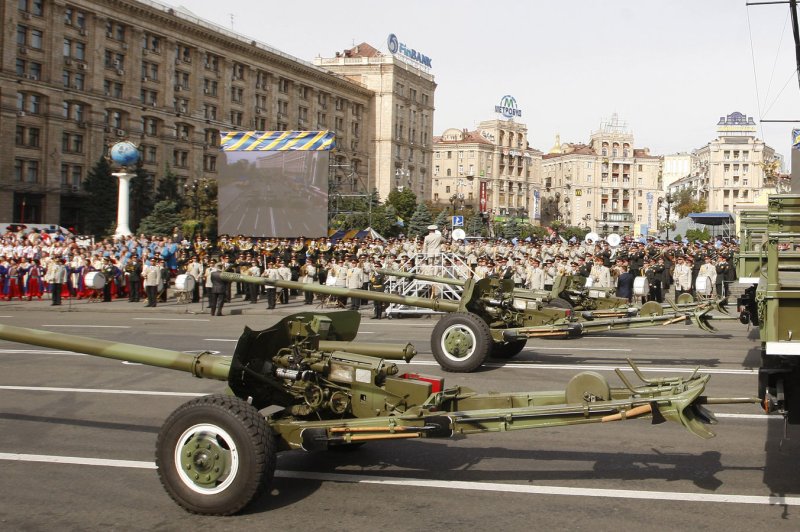Ukrainian artillery is displayed during the Independence Day military parade in Kiev on Aug. 24, 2014. Pro-Russian rebels pulled heavy weaponry away from the front in eastern Ukraine on March 7, 2015, per the requirements of the Minsk agreement. Kiev said it would do the same by the end of Saturday. Photo by Ivan Vakolenko/UPI |
License Photo
DONETSK, Ukraine, March 7 (UPI) -- The leader of a pro-Russian rebel group in eastern Ukraine says his forces have fully removed heavy weapons such as artillery and rockets from front-line positions.
The move is the latest compliance with a deal struck in Minsk last month calling for a ceasefire in the conflict as well as a full prisoner swap and the creation of a buffer zone void of heavy weapons from both sides.
The agreement requires artillery pieces 100mm and up to be pulled at least 31 miles from the front and rocket systems to be pulled back 86 miles.
"We have withdrawn from the contact line all arms with a caliber of over 100mm," Alexander Zakharchenko, head of the self-proclaimed Donetsk People's Republic, said on Saturday. "Unfortunately, Ukraine has not done that."
The Kiev government said it would do so by the end of Saturday.
Late last month both sides swapped scores of prisoners -- over 50 rebels for 139 Ukrainian soldiers -- signalling one of the first steps toward compliance with the Feb. 12 Minsk agreement, which was in danger of complete collapse after fighting continued in Debaltseve, near the Russian border. Rebel forces seized the town and argued that the ceasefire did not apply there.
Further instability, including the bombing of a pro-Ukraine rally in Kharkiv one day after the prisoner swap, has raised doubts about the ceasefire despite compliance with its other points.
The Ukrainian conflict has raged since April 2014 when the Donetsk and Luhansk regions attempted to secede from Ukraine following Russia's annexation of Crimea. According to the United Nations, as of early March at least 6,000 people have been killed in the fighting.
The Minsk agreement also recognizes self-rule for the Donetsk and Luhansk regions but within a Ukrainian border, with further negotiations on their status pending.















